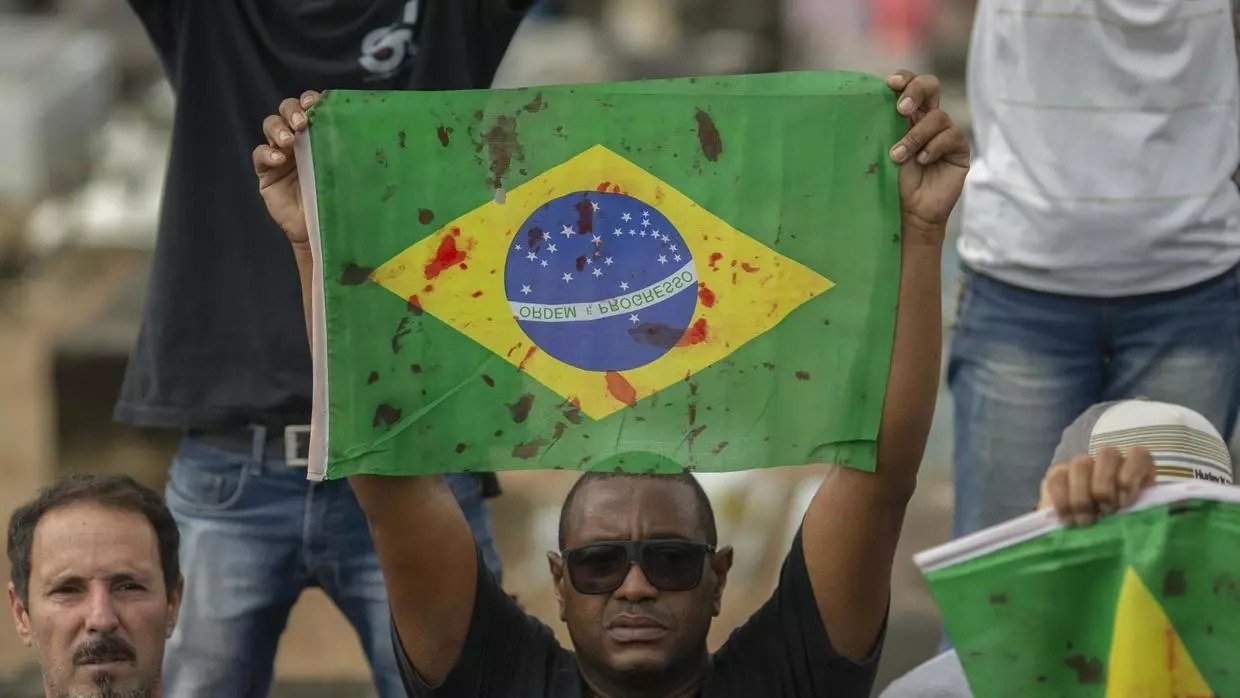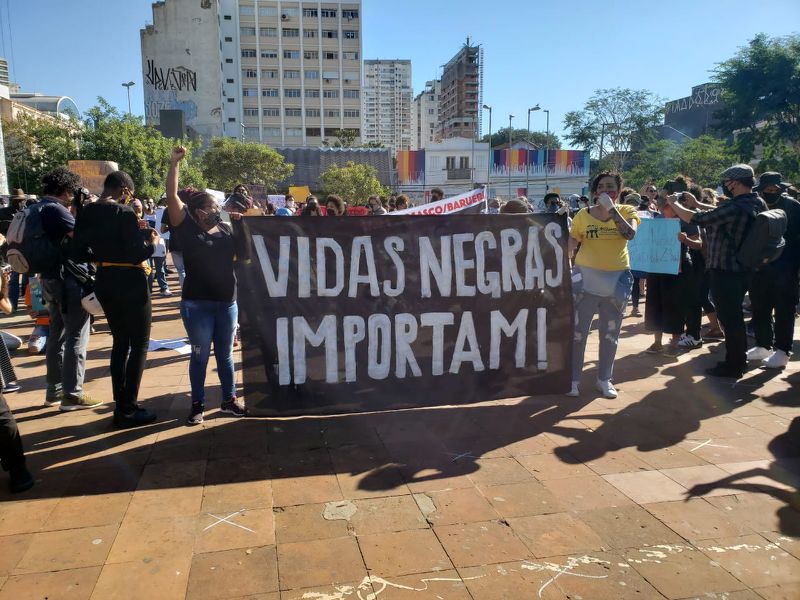RIO DE JANEIRO, BRAZIL – The title phrase sounds recent, but in reality is over 40 years old, having been the theme of an anti-racism rally held in 1978 at São Paulo’s Municipal Theatre. The statement is now revivified in a new manifesto, printed in full page in Sunday’s editions of the Folha de S.Paulo and O Globo newspapers.
The campaign “As long as there is racism there will be no democracy” is promoted by the ‘Coalizão Negra por Direitos’ (Black Coalition for Rights), which unites over 100 black movement organizations from all over the country, in partnership with the ‘Legítima Defesa’ (Legitimate Defense) and ‘Frente 3 de Fevereiro’ (February 3rd Front) groups.
It seeks to collect signatures to promote a “broad front” based on actions to fight racism and demand rights such as education, employment and security from the public authorities. It is part of the realization that the anti-racist struggle needs to become central to the discussions in defense of democracy and against the Bolsonaro Government that have gained ground in recent weeks.

“Any project or articulation for democracy in the country requires a firm and real commitment to fighting racism. We call on the democratic sectors of Brazilian society, the institutions and people who today display emotion at the ills of racism and claim to be anti-racists: be consistent. Practice what you preach,” says the text of the manifesto.
“There has been a lot of talk about renegotiating, about creating a new democratic pact in Brazil. But one cannot think about real democracy in Brazil if racism is not a core point,” explains Eugênio Lima, founder of Legítima Defesa e Frente 3 de Fevereiro and one of the initiative’s organizers.
In his opinion, the agenda cannot be a sideline in the street protests against authoritarianism or even in manifestos that preach unity in favor of the democratic regime – such as #Juntos, also published in newspapers in May, which united leftist Fernando Haddad and TV host Luciano Huck in a campaign that tries to emulate the broad front achieved in the early 1980s with ‘Diretas Já’, the massive spontaneous civil movement which, in 1984, demanded direct presidential elections in Brazil.
“The abuse of the Bolsonaro Government is clear, but this is not only a government issue. It is an agenda for Brazilian society. At this time, when we are discussing ways to think about a new democratic structure for society, there is no democracy without the fight against racism,” Lima says. “We are coming out to denounce the terrible living conditions of the black community.”
At a time when the racism agenda is once again attracting attention in Brazil’s streets, in the wake of the wave of protests against the death of George Floyd, a black man suffocated under custody by the knee of a white policeman in the United States, and when a pandemic is claiming the lives of the most impoverished population who cannot stay home to protect themselves, this sentence seems to belong to this harsh year of 2020.
But it is an excerpt from the founding manifesto of the ‘Movimento Negro Unificado Contra a Discriminação Racial’ (Unified Black Movement Against Racial Discrimination), which in July 1978 staged a major rally on the stairs of the Municipal Theater of São Paulo to call on black men and women to protest against racial violence.
Haddad’s signature is one of 132 highlighted by the manifesto to represent the years of “inconclusive abolition” of slavery. Also endorsing the text are researchers Djamila Ribeiro and Sueli Carneiro, environmentalist and indigenous leader Ailton Krenak and international names such as Danny Glover, Mia Couto and Valter Hugo Mãe. New memberships will be collected by the website comracismonaohademocracia.org.br, also released on Sunday. Altogether, around 5,000 signatures have already been secured in a pre-campaign via WhatsApp, according to the organizer.
Lima explains that the “broad front” concept, including the support of white and indigenous people from different sectors of the population, is important because the racial issue is “part of the system” and will only be overcome when the whole of society shifts from the shock of “the cruelty practiced against blacks” to practical changes that promote equality, fostered by those in power – mostly whites. Hence the initial strategy of publishing in national newspapers. “It often seems that anti-racist practice is a choice, not a condition for democracy to exist. No: the antiracist struggle is the survival of democracy,” he says.
Protests
The movement is launched on the day when new protests in defense of democracy and against the Jair Bolsonaro government were expected to fill the streets -and social media. In São Paulo, an anti-fascism and anti-racism rally called by organized soccer fan clubs, the ‘Frente Povo Sem Medo’ (Fearless People’s Front) and black activists groups were summoned for the third consecutive weekend. This time, the demonstrators return to Paulista Avenue, where the first protest took place, which ended in a clash with the State Police; they plan to stretch out a 100-meter-long flag with a message against the President.
Danilo Pássaro, national coordinator of ‘Somos Mais Democracia’ (We are More Democracy), which includes organized soccer fans, says it is necessary to build unity for democracy. “It is something that should have been done much earlier and by political parties, but it did not happen because of resentments among them. But we have democracy and the Brazilian people as our priority,” he says.

As an example of this unity, he mentions the initial endorsement by soccer fans from rival teams – fans from Palmeiras, Santos and São Paulo took to the streets with Corinthians followers – and points out the presence of middle-class people in the movement started by the suburbs. “We didn’t take to the streets to protest, we were already on the streets,” he explains. “For most of us there was never quarantine. A policy of social protection was not guaranteed to us, and the government made us break isolation through financial suffocation. Many of us are casual workers and we need to go out on the streets to survive,” he says.
Also on Sunday, the ‘Levante das Mulheres Brasileiras’ (Brazilian Women’s Uprising) movement promotes social media actions against the government. The first initiative was on Twitter, starting at 2 PM, through the hashtag #MulheresDerrubamBolsonaro (#WomenOverthrowBolsonaro). At 2:30 PM, a live broadcast on the movement’s YouTube and Facebook pages was scheduled.
The fight against racism is also on the agenda. “Bolsonaro’s catastrophic policy – which kills a thousand Brazilians every day by Covid-19, exacerbates necropolitics and genocide of young black people, increases inequality and impoverishment, removes rights, wants to arm the population, spreads lies and hatred, advocates the dictatorship, racism and fascism – has mobilized the Levante das Mulheres to produce a manifesto to pressure the Republic’s institutions”. The letter had collected over 11,000 signatures by Saturday.
Source: El Pais

